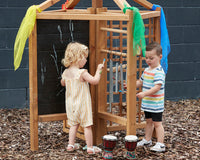In 2013, a study by the British Psychological Society found that playing music can promote social behaviour and boost problem-solving skills, but this is just one of many studies that reveal the many benefits that music and music therapy can have. Music has been found to help children with depression, to improve behaviour in children with autism and to improve social communication. If your child already has a natural love for this special art, what steps can you take to support them?
Giving Children Choice
Sometimes, selecting an instrument for a child that is not the right fit for them can result in a loss of interest in playing music. Ideally, you should have a few ‘toy’ versions of instruments like guitars, drums, and pianos, so you can see which one your child seems to enjoy playing more. Once your child chooses, ensure they have the correct size of instrument. When it comes to guitar sizing for kids, for instance, two aspects are key: the size of the guitar itself and the scale length. A professional should help you try out different instruments until your child finds their perfect match.
 Enjoying Music Together
Enjoying Music Together
A 2018 University of Arizona study shows that children who grow up listening to music with their parents have better relationships with them when they reach young adulthood. The researchers stated that “If you play or listen to music with your parents, you might do synchronized activities like dancing or singing together, and data shows that that causes you to like one another more.” Shared listening experiences can be simple (e.g. watching a musical video on YouTube) or more complex (such as playing in a band together). Any shared experience, said researchers, will foster parent-child bonding.

Fostering their Musical Knowledge
A love of music can be strengthened by enriching a child’s repertoire. This involves not only playing a wide variety of tracks, but also exposing children to a wide range of music. If you have regular music appreciation lessons, you can present your child to music from different decades (many children love the 1960s and the music of groups like The Beatles) and from different cultures as well. You can also introduce them to music from different genres — including classical, R ‘n B, and pop. Your child may also like to play along to current hits.

Enjoying Live Performances
There are often outdoor musical performances in parks and outdoor performance venues. Children who play music will probably enjoy seeing professional musicians playing similar instruments to those they play at home. Outdoor performances may also inspire your children to take part in recitals and musical shows for friends, family, and schoolmates.

Finding a Great Teacher
A teacher who really ‘clicks’ with your child will make classes engaging. A study by researchers at the University of Eastern Finland found, for instance, that empathetic children enhance children’s motivation. A good teacher will get to know your child and cater the class to your child’s interests and abilities. They will also ensure that the fun factor is high, often using games and humor to make classes more amenable.

If your child already loves music, then they are probably benefitting from this hobby in many ways. You can do your share to ensure this hobby lasts, by providing them with the right instruments and ensuring they have a good teacher. You can also enrich their musical knowledge and share their passion by listening to or playing music together.




















